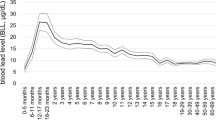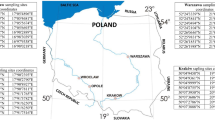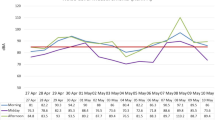Abstract
LEAD levels in blood are generally found to be higher in city dwellers than in those living in the country1–6. This difference has been linked to the increased background levels of lead, which result to a large extent from the emission of lead in motor car exhaust gases. In Birmingham, the opening of the M6–A38(M) interchange provided an opportunity to test this hypothesis by studying the effect of an increase in traffic density on the concentration of lead in the blood of those living close to the interchange.
This is a preview of subscription content, access via your institution
Access options
Subscribe to this journal
Receive 51 print issues and online access
$199.00 per year
only $3.90 per issue
Buy this article
- Purchase on Springer Link
- Instant access to full article PDF
Prices may be subject to local taxes which are calculated during checkout
Similar content being viewed by others
References
Hofreuter, D. H., Catcott, E. J., Keenan, R. G., and Xintaras, C., Archs envir. Hlth, 3, 568–573 (1961).
Goldwater, L. J., and Hoover, A. W., ibid., 15, 60–63 (1967).
Kubota, J., Lazar, V. A., and Losee, F., ibid., 16, 788–793 (1968).
Tepper, L. B., and Levine, L. S., A Survey of Air and Population Lead Levels in Selected American Communities: Final Report (University of Cincinatti, 1972).
Cohen, C. J., Bowers, G. N., and Lepow, M. L., J. Am. med. Ass., 226, 1430–1433 (1973).
Caprio, R. J., Margulis, H. L., and Joselow, M. M., Archs envir. Hlth, 28, 195–197 (1974).
McLaughlin, M., Linch, A. L., and Snees, R. D., ibid., 27, 305–311 (1973).
Knelson, J. H., Johnson, R. J., Coulston, F., Golberg, L., and Griffin, T., in Proc. int. Symp. Environmental Health Aspects of Lead, 391 (EEC, Luxembourg, 1973).
First Report of Joint Working Party on Lead Pollution Around Gravelly Hill (Department of the Environment, London, 1974).
Knelson, J. H., and Bridbord, K., Staub-Reinhalt. Luft, 33, 449–451 (1973).
Knelson, J. H., Coulston, F., Golberg, L., Griffin, T., and Bradely, J., ibid., 33, 446–448 (1973).
Butler, J. D., McMurdo, S. D., and Middleton, D. R., Proc. Ann. Conf. on Environmental Health, 69 (Association of Public Health Inspectors, London, 1974).
Robinson, E., and Ludwig, F., Final Report PA-4788 (Stanford Research Institute, Stanford, 1964).
Lee, R. E., Patterson, R. K., and Wagman, J., Envir. Sci. Tech., 2, 288–290 (1968).
Cholak, J., Schaffer, L. J., and Yeager, D., Am. ind. Hyg. Ass. J., 29, 562–568 (1968).
Lundgren, D. A., J. Air Pollut. Control Ass., 20, 603–608 (1970).
Lawther, P. J., Commins, B. T., Ellison, J. McK., and Biles, B., in Lead in the Environment (edit. by Hepple, P.), 8 (Institute of Petroleum, London, 1972).
Author information
Authors and Affiliations
Rights and permissions
About this article
Cite this article
WALDRON, H. Lead levels in blood of residents near the M6–A38(M) interchange, Birmingham. Nature 253, 345–346 (1975). https://doi.org/10.1038/253345a0
Received:
Revised:
Issue Date:
DOI: https://doi.org/10.1038/253345a0
Comments
By submitting a comment you agree to abide by our Terms and Community Guidelines. If you find something abusive or that does not comply with our terms or guidelines please flag it as inappropriate.



